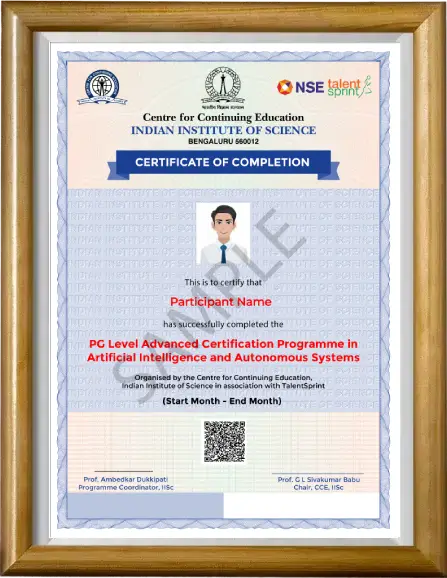Autonomous systems, robots, and AI are transforming business and society, boosting productivity and
driving economic growth.
In a nutshell, autonomous systems are systems that can accomplish a task, achieve a goal, or
interact with its surroundings with minimal to no human involvement. Some examples include
self-driving cars, UAVs, smart manufacturing robots, care robots for the elderly, and virtual agents
for training or support.
A study by Forbes reports that AI/ML, robotics, and autonomous machines are expected to drive 70% of GDP growth between now
and 2030 globally. Further, the report also states that the massive adoption of autonomous systems
could soon transition superpowers like America into a machine economy.
To fully move and embrace this intelligent system's future, companies need a skilled workforce to
support these initiatives and help the organisation prepare for the future.
The PG Level Advanced Certification Programme on Artificial Intelligence and Autonomous Systems offered by TalentSprint in collaboration with CCE at IISc aims to prepare professionals to lead and navigate the era of intelligent automation.





 Live Interactive Sessions With expert faculty members from IISc
Live Interactive Sessions With expert faculty members from IISc  Experiential Learning Supported by use-cases and
Experiential Learning Supported by use-cases and Hi-Tech Hi-Touch Learning
Hi-Tech Hi-Touch Learning  Experience IISc campus
1 campus visit
Experience IISc campus
1 campus visit








 Master
Reinforcement Learning, Neural Networks
Master
Reinforcement Learning, Neural Networks
 Automate Critical
Automate Critical
 Amplify your organization’s
Amplify your organization’s
 Implement
an autonomous system with AI functionalities
Implement
an autonomous system with AI functionalities
 Get certified by the Centre
for Continuing Education at IISc
Get certified by the Centre
for Continuing Education at IISc
 Have a holistic
Have a holistic




